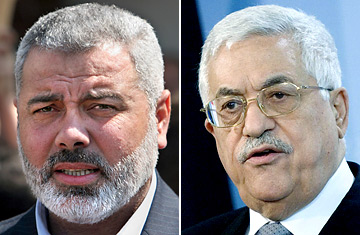
Palestinian Authority caretaker Prime Minister Ismail Haniyeh of Hamas, left, and Palestinian President Mahmoud Abbas.
The internal strife is often cast as a battle between Hamas and Fatah, but the reality is more complex, involving also clan battles, crime syndicates and old feuds. In the wake of the Mecca agreement that led to the unity talks, those old fissures are widening and new ones forming. Abbas' Sunday meeting with Israeli Prime Minister Ehud Olmert rubbed a number of senior Fatah people the wrong way. Afterwards, at a meeting of Fatah's Central Committee, according to a Committee member who was in attendance, Abbas was fiercely criticized for "engaging in a public relations stunt" and accused of "helping [Olmert] without getting anything in return." Fatah strongman Mohammed Dahlan commands his own following, as does another of Yasir Arafat's ex-capos, Marwan Barghouti, despite being in jail. More recently, another faction, this one led by former Prime Minister Ahmed Qurei, has also become more vocal in its opposition to Abbas, worrying that by rubbing shoulders with Olmert and U.S. Secretary Condoleezza Rice, he is costing Fatah much needed public support — "losing the street," says the Central Committee member.
Evidence of how mean those streets can be was seen again in Gaza City yesterday, when gunmen kidnapped veteran BBC reporter Alan Johnston, who has lived and reported in Gaza for the past three years. Leaders from both Fatah and Hamas immediately decried the kidnapping, with Hamas government spokesman Ghazi Hamad calling it a "brutal and criminal action, and a shameful action, done by irresponsible people who are trying to create more tension in our society." There are clearly a number of groups seeking to do that, and others seeking to create more tension within Hamas itself. Among them are Hamas militants trying to undercut the efforts of Haniyeh and Khaled Mashal, Hamas's leader in Damascus, to find common ground with Fatah and establish the unity government. If not by kidnapping, they will use other means to block those efforts, says one Hamas military commander. He did not take responsibility for the kidnapping but did say, referring to Haniyeh and Mashal, "We are not going to let them sell us out as Fatah sold out its fighters" with the Oslo Agreement in 1993, when Arafat formally recognized Israel. (In the past year, kidnapped reporters have mostly been released within a matter of days, though a team from Fox was held for two weeks; Palestinian authorities have said they are searching without pause for Johnston.)
The more militant jihadis in Hamas may well have been emboldened by criticism Sunday of the Hamas political leadership by Ayman al Zawahiri, al-Qaeda's chief ideologue, who said they were surrendering the dream of the Palestinian people to preserve their place in an ineffectual government. Several Hamas leaders fired back, but there now exists the curious coincidence of Zawahiri wanting the same thing Olmert and President Bush (and many members of Fatah) want, which is for Hamas to fall apart. Abbas and Haniyeh may be able to solve the immediate issues before them, and succeed in announcing the new cabinet slate in the coming days. But there's even more evidence now that unity is still a long way off.
